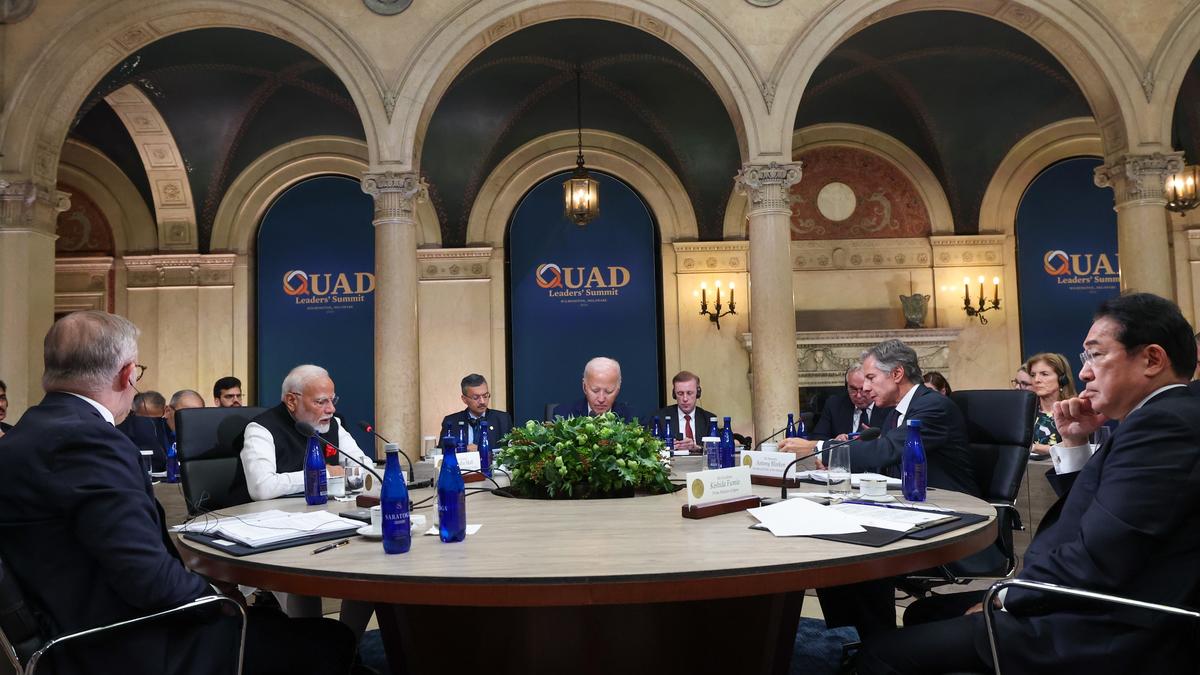
A re-balancing of India’s great power relations Premium
The Hindu
By attempting to play a meaningful role in resolving an intractable conflict of epic global proportions, India can hope to reset the terms of its engagement with the West and Russia
Prime Minister’s Narendra Modi’s participation in the sixth Quad Leaders’ Summit in Wilmington, Delaware, U.S. on September 21, 2024 has raised further hopes of consolidating security cooperation among the “four leading maritime democracies in the Indo-Pacific”. Nevertheless, it was India’s National Security Adviser (NSA) Ajit Doval’s trip to Russia in early September for the BRICS (Brazil, Russia, India, China, South Africa) NSA meeting, which included a high-profile personal meeting with Russian President Vladimir Putin, that needs greater analysis. Mr. Doval also held one-on-one parleys with the Chinese Foreign Minister Wang Yi, which was equally significant since India is leaving no stone unturned to resolve the four-year-old military standoff with China at the Line of Actual Control (LAC).
India is currently busy bargaining with China, and protecting its interests while trying to keep the U.S. engaged in maintaining a rules-based order in the Indo-Pacific. The fundamental idea behind the Quad (Australia, Japan, India and the U.S.) is the creation of a strategic consortium of principles, interests and purposes that would not only strengthen each country individually but would also be capable of jointly countering the revisionist challenge to the existing global order. This is where India’s relations with Russia become significant since Moscow is a bitter opponent of the Quad.
It is not easy for India’s security managers and diplomats to make this complex game work in New Delhi’s interest. However, Mr. Doval has a reputation for being imaginative, nimble and persuasive. The Doval-Putin meet, where Mr. Doval conveyed Mr Modi’s Ukraine peace plan, may be interpreted as India’s attempt to cross the psychological Rubicon in great power diplomacy.
There is little doubt about India’s willingness, as an aspiring global power, to shoulder the responsibility in peace making which may include the meaningful role of a dialogue facilitator or an interlocutor, if not mediator. The Doval-Putin meet was after Mr. Modi’s first-ever visit to Ukraine in August, and to Moscow in July. In particular, the Russia visit had drawn scathing criticism from Ukraine. But despite its criticism of Indian policies, Ukraine, on many occasions, has asked New India to help resolve the conflict.
Mr. Doval subsequently met French President Emmanuel Macron in Paris, on the sidelines of annual India-France Strategic Dialogue, to apprise him of India’s mediatory efforts. Many factors have prompted India to insert itself into global peace-making initiatives, and India’s Russia dilemma is the most important of them. While India’s strategic relationship with the U.S. is relatively new, India-Russia relations have endured for over six decades, and New Delhi has no appetite to relinquish the military advantages that come with this relationship. But since the war in Ukraine has triggered Russia’s total break with the West, Moscow’s pivot toward China has become even more pronounced. Functioning more or less as the junior partner of China, Russia has been struggling to preserve its partnership with India since its leverage with China has steadily shrunk due to fierce military resistance by Ukraine.
OPINION | India and a case for strategic autonomy
From an Indian perspective, this needs correction because the Russia-China economic-military ties are getting too close to be ignored by New Delhi.











